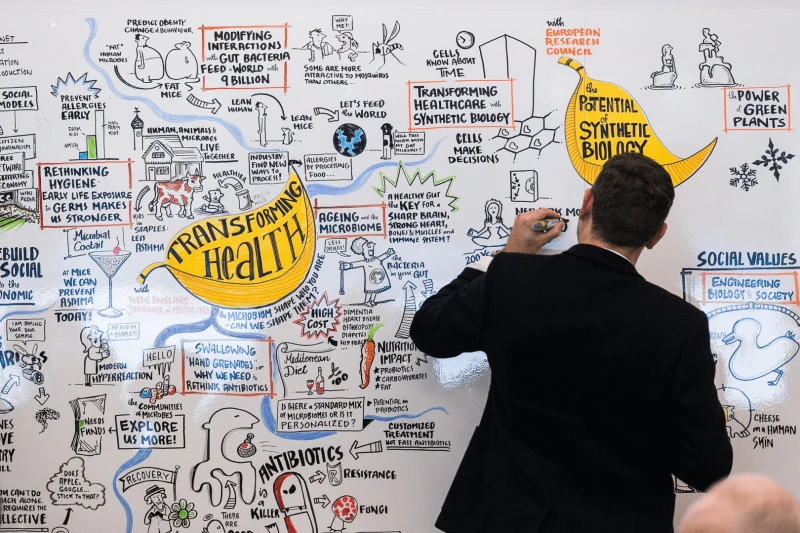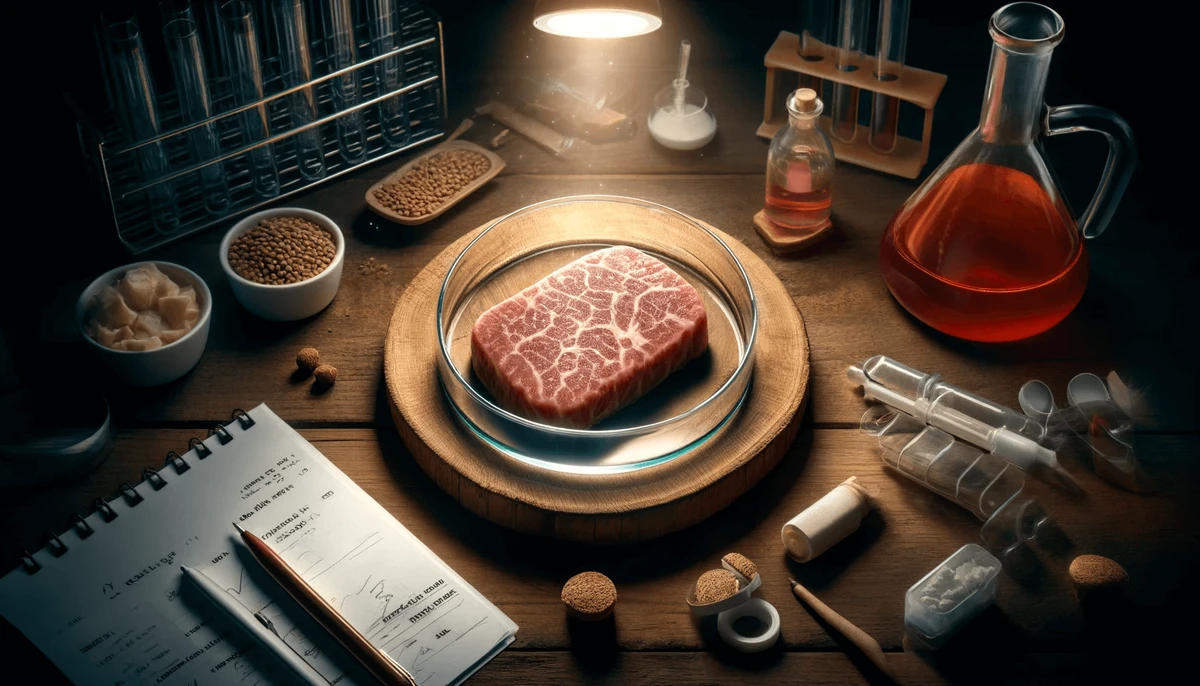Where will synthetic biology for agriculture be in a decade? Here are six experts on the cutting edge of innovation
Where will synthetic biology for agriculture be in a decade? Here are six experts on the cutting edge of innovation


The global population is growing, resources are dwindling, and it’s getting harder to feed everyone. We’ve all heard these statistics before. The big question is, where are we on the timeline of developing novel solutions to these challenges?

If these conversations are an indication of what the food and ag panel sessions have in store for us in just a few weeks, then I can tell you that you don’t want to miss them. The pace of innovation is picking up; several challenges have been met, new ones are being tackled, and the future of food looks more promising than ever.
Challenges behind, challenges ahead
I’ll never forget one of the first articles I read about cultivated meat many years ago. I don’t remember it for the amazing scientific achievement or the reactions of those who tasted it. What I remember about it was the astronomical price tag to make one burger: over $300,000. Right then and there, I relegated lab-grown meat to the “nice idea but never going to happen” bin in my mind.
Thanks in large part to synthetic biology, I was too quick to dismiss cellular agriculture—the industrial production of animal-based foods. The industry has made a lot of progress in the 11 years since that first burger was introduced, and costs, while still prohibitive to consumers have dropped exponentially, largely due to the development of better scaffolds, media, and cell lines. If we continue as we have been, we may soon solve the cost problem. Some are closer than others.

Sourcing the capital in and of itself is a major challenge because in general, VCs don’t like to invest in the capital expenditure (capex) required for scale. There are a few ways this problem could be solved.
Max Jamilly’s company Hoxton Farms, which is developing cultivated fats, is working to lower the barrier to entry for capex for VCs. “We’re solving the problem at Hoxton Farms with our proprietary scale-out bioreactors, which significantly lower the capex for large-scale production,” he says. This doesn’t seem to be the only approach that’s working for Hoxton Farms, however. Rob Leclerc, a founding partner of AgFunder, says Hoxton Farms was an obvious choice for AgFunder not just because the company is focused on unit economics but also because they’re developing something “fundamentally different.”
Neta Lavon, co-founder and CTO of Aleph Farms, believes that governments should help bridge the gap, playing a bigger role in providing the capex that companies need to successfully scale.
“We need governments to invest in capital expenditures. There has been a big improvement in government funding of research in academia, and in industry, there are grants and consortiums, but this is not enough,” she says. “The public sector should work hand-in-hand with both conventional animal agriculture and cellular agriculture sectors to build incentive programs, develop regulatory frameworks, and invest in public research and infrastructures in order to meet key objectives in relation to the environment, public health, and the economy.”
Governments won’t just be important for funding, however—companies and governments will need to work closely together to navigate the regulatory landscape. Some companies have already managed this; Aleph Farms’ beef, for example, received approval from Israel’s Ministry of Health earlier this year—the first cultivated beef product with approval anywhere.
Ultimately, successfully navigating all of these challenges depends on “building the right partnerships,” says Andrew Ive of Big Idea Ventures. “My biggest piece of advice to founders is to focus on building strong partnerships with industry experts, investors, and regulatory bodies to help navigate the complex landscape of this emerging field. By staying innovative, collaborative, and adaptable, founders can position themselves for long-term success. I’d like them to remember it’s not just about the science; companies with great science still die if they don’t focus on building the right company and the right partnerships.”
And, of course, as Leclerc, Jamilly, and Lavon emphasized, there is one final and crucially important piece of the puzzle: consumers. Perhaps the biggest challenge in the near future for companies in this space will be educating consumers about the benefits of cellular agriculture—both for them and for the planet—and navigating pushback from those who benefit from traditional animal agriculture.
It isn’t all about meat
So, if cultivated meat is a hard sell for some consumers, why focus on it at all? Why not just move forward with plant-based protein? Well, for one thing, says Leclerc, “there are still major deficiencies in plant-based proteins—cost being one of them, with flavor and texture being others.”
This is actually why Hoxton Farms’ choice of fat was attractive to AgFunder. Mixing a bit of fat in with plant-based protein could provide the flavor profile needed to please consumers and is an out-of-the-box idea that Leclerc believes has huge potential. A perfect example of what a mixed approach can offer, Aleph Farms’ first cultivated beef steak (Aleph Cuts) is a hybrid product that, as Lavon says, “offers the functionality of other animal proteins and provides diners with something they cannot find in either conventional meat or fully plant-based alternatives.”
Hybrid products and technological advances mean that plant-based protein isn’t down and out—particularly for those consumers who choose not to eat meat for health purposes rather than ethical or sustainability issues. But it’s also critically important to remember that it isn’t all about meat—dairy products like milk and cheese can also be made without animals using synthetic biology— or even protein. DeNovo Food Labs and Conagen are two companies that use fermentation to produce high-quality, functional ingredients and nutrients that can be used to improve the flavor and nutritional value of a wide variety of foods.
Is it really more sustainable?
Early arguments suggested that cultivated meat, plant-based protein, and fermentation of food ingredients may not actually be that sustainable because even lab-based processes use tons of resources (water for media, electricity to run fermenters, etc.), but I think those arguments are quickly dying out.
Each person I talked to explained the very specific ways their respective companies support sustainable practices, whether by relieving strained ecosystems (Blue Nalu’s cultivated seafood), practicing “reduce, reuse, and recycle” during production (Aleph Farms), decreasing water and land use (Hoxton Farms, Blue Nalu, and Aleph Farms), or eliminating the need for harmful, resource-intensive harvesting practices by using fermentation instead (DeNovo Food Labs and Conagen).
And although sustainability is a huge part of a future built on cellular (and acellular) agriculture, it isn’t the only benefit. Ive reminded me these advances offer “exciting possibilities for creating novel food products that are tailored to consumer preferences and personal health and nutritional needs. From lab-grown burgers to dairy-free cheese made from yeast cultures, the range of products that could be developed is vast. Overall, a future that relies on cellular agriculture has the potential to transform our food system for the better, offering solutions to some of the most pressing challenges facing our planet today.”
Endless possibilities
As I closed out my conversations, one thing became clear: although we still have a lot of work to do before some of these products hit the shelves, we’ve overcome the activation energy and are well on our way to delivering exciting, delicious and nutritious, sustainable food to the world. I asked each person I interviewed what they’re excited about in the future, and their answers were incredibly inspiring.
Casey Lippmeier, Senior VP at Conagen, said he’s excited about cheese, “specifically, mozzarella. Nearly 70% of the world’s population cannot enjoy cheese, being either lactose intolerant or having some level of lactose malabsorption after weaning. The options for lactose-free mozzarella in our grocery store have not been appealing, or are far too expensive, or both.” As a cheese-lover myself, I can get on board with this idea.

Others, like Ive, Jamilly, Lavon, and Cooperhouse, are looking forward to finally delivering the big achievements the industry has been promising but hasn’t been able to yet because of historical technological and cost challenges—solving the sustainability and ethical problems associated with traditional animal and plant agricultural practices.
And, of course, synthetic biology will continue to play a star role in making all this happen. Perhaps Lippmeier summed it up best: “Without the contributions synthetic biology has already made to conventional agriculture, most of us wouldn’t be able to afford to eat. These contributions are only growing in number and efficiency, and as they do, new applications are enabled.”
I can’t wait to see those new applications hitting the market.
This is only a small sampling of what I talked about with Ive, Leclerc, Jamilly, Lippmeier, Cooperhouse, Louwrens, and Lavon. To hear more from these leaders and others working on and funding big innovations in cellular and acellular agriculture, be sure to check out the panel sessions happening at SynBioBeta 2024 in San Jose, May 7-9.
Read the original post here

 | Videos | More... |

Video: Nuclear energy will destroy us? Global warming is an existential threat? Chemicals are massacring bees? Donate to the Green Industrial Complex!
 | Bees & Pollinators | More... |

GLP podcast: Science journalism is a mess. Here’s how to fix it

Mosquito massacre: Can we safely tackle malaria with a CRISPR gene drive?

Are we facing an ‘Insect Apocalypse’ caused by ‘intensive, industrial’ farming and agricultural chemicals? The media say yes; Science says ‘no’
 | Infographics | More... |

Infographic: Global regulatory and health research agencies on whether glyphosate causes cancer
 | GMO FAQs | More... |

Why is there controversy over GMO foods but not GMO drugs?

How are GMOs labeled around the world?

How does genetic engineering differ from conventional breeding?
 | GLP Profiles | More... |

Alex Jones: Right-wing conspiracy theorist stokes fear of GMOs, pesticides to sell ‘health supplements’




 Viewpoint — Fact checking MAHA mythmakers: How wellness influencers and RFK, Jr. undermine American science and health
Viewpoint — Fact checking MAHA mythmakers: How wellness influencers and RFK, Jr. undermine American science and health Viewpoint: Video — Big Solar is gobbling up productive agricultural land and hurting farmers yet providing little energy or sustainabilty gains
Viewpoint: Video — Big Solar is gobbling up productive agricultural land and hurting farmers yet providing little energy or sustainabilty gains Fighting deforestation with CO2: Biotechnology breakthrough creates sustainable palm oil alternative for cosmetics
Fighting deforestation with CO2: Biotechnology breakthrough creates sustainable palm oil alternative for cosmetics Trust issues: What happens when therapists use ChatGPT?
Trust issues: What happens when therapists use ChatGPT? 30-year-old tomato line shows genetic resistance to devastating virus
30-year-old tomato line shows genetic resistance to devastating virus California, Washington, Oregon forge immunization alliance to safeguard vaccine access against federal undermining
California, Washington, Oregon forge immunization alliance to safeguard vaccine access against federal undermining The free-range chicken dilemma: Better for birds, but with substantial costs
The free-range chicken dilemma: Better for birds, but with substantial costs ‘You have to treat the brain first’: Rethinking chronic pain with Sanjay Gupta
‘You have to treat the brain first’: Rethinking chronic pain with Sanjay Gupta
